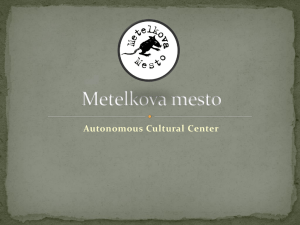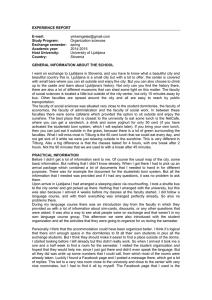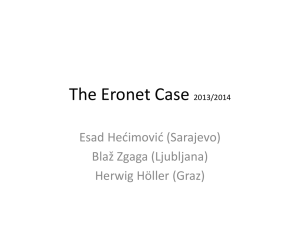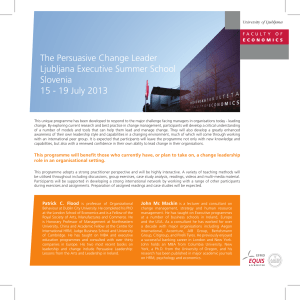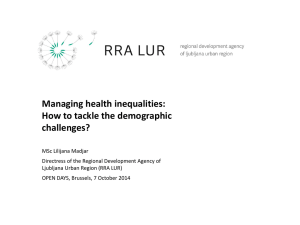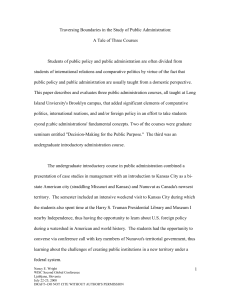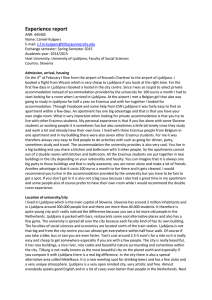EXPERIENCE REPORT E-mail: Study Program: Human Resource Studies
advertisement
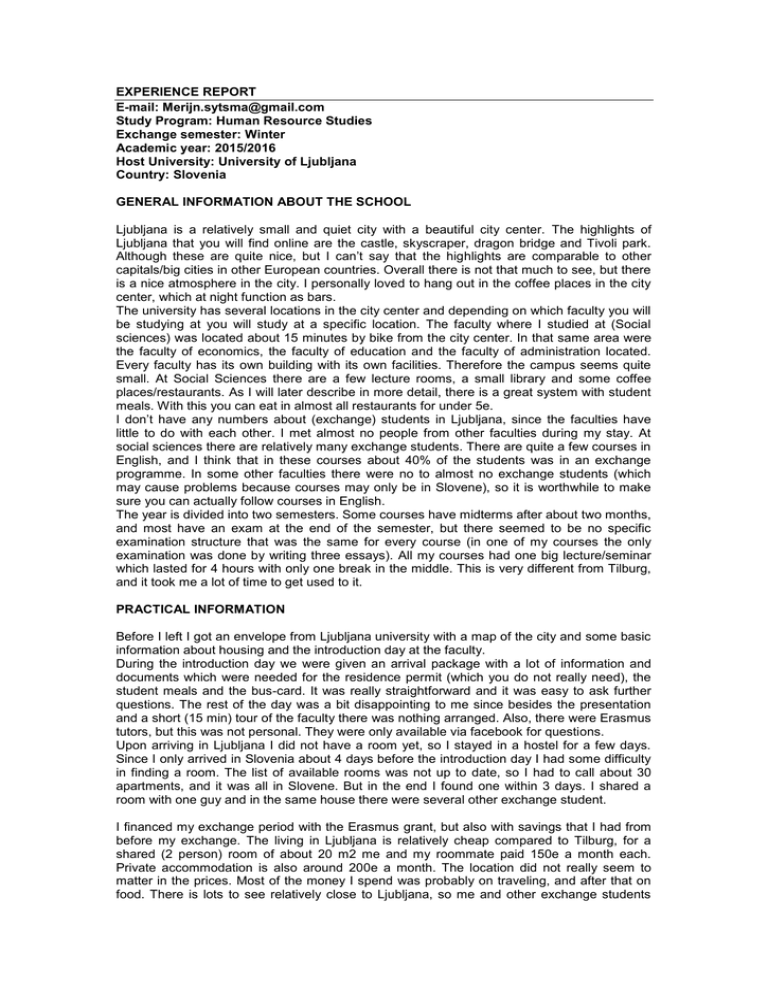
EXPERIENCE REPORT E-mail: Merijn.sytsma@gmail.com Study Program: Human Resource Studies Exchange semester: Winter Academic year: 2015/2016 Host University: University of Ljubljana Country: Slovenia GENERAL INFORMATION ABOUT THE SCHOOL Ljubljana is a relatively small and quiet city with a beautiful city center. The highlights of Ljubljana that you will find online are the castle, skyscraper, dragon bridge and Tivoli park. Although these are quite nice, but I can’t say that the highlights are comparable to other capitals/big cities in other European countries. Overall there is not that much to see, but there is a nice atmosphere in the city. I personally loved to hang out in the coffee places in the city center, which at night function as bars. The university has several locations in the city center and depending on which faculty you will be studying at you will study at a specific location. The faculty where I studied at (Social sciences) was located about 15 minutes by bike from the city center. In that same area were the faculty of economics, the faculty of education and the faculty of administration located. Every faculty has its own building with its own facilities. Therefore the campus seems quite small. At Social Sciences there are a few lecture rooms, a small library and some coffee places/restaurants. As I will later describe in more detail, there is a great system with student meals. With this you can eat in almost all restaurants for under 5e. I don’t have any numbers about (exchange) students in Ljubljana, since the faculties have little to do with each other. I met almost no people from other faculties during my stay. At social sciences there are relatively many exchange students. There are quite a few courses in English, and I think that in these courses about 40% of the students was in an exchange programme. In some other faculties there were no to almost no exchange students (which may cause problems because courses may only be in Slovene), so it is worthwhile to make sure you can actually follow courses in English. The year is divided into two semesters. Some courses have midterms after about two months, and most have an exam at the end of the semester, but there seemed to be no specific examination structure that was the same for every course (in one of my courses the only examination was done by writing three essays). All my courses had one big lecture/seminar which lasted for 4 hours with only one break in the middle. This is very different from Tilburg, and it took me a lot of time to get used to it. PRACTICAL INFORMATION Before I left I got an envelope from Ljubljana university with a map of the city and some basic information about housing and the introduction day at the faculty. During the introduction day we were given an arrival package with a lot of information and documents which were needed for the residence permit (which you do not really need), the student meals and the bus-card. It was really straightforward and it was easy to ask further questions. The rest of the day was a bit disappointing to me since besides the presentation and a short (15 min) tour of the faculty there was nothing arranged. Also, there were Erasmus tutors, but this was not personal. They were only available via facebook for questions. Upon arriving in Ljubljana I did not have a room yet, so I stayed in a hostel for a few days. Since I only arrived in Slovenia about 4 days before the introduction day I had some difficulty in finding a room. The list of available rooms was not up to date, so I had to call about 30 apartments, and it was all in Slovene. But in the end I found one within 3 days. I shared a room with one guy and in the same house there were several other exchange student. I financed my exchange period with the Erasmus grant, but also with savings that I had from before my exchange. The living in Ljubljana is relatively cheap compared to Tilburg, for a shared (2 person) room of about 20 m2 me and my roommate paid 150e a month each. Private accommodation is also around 200e a month. The location did not really seem to matter in the prices. Most of the money I spend was probably on traveling, and after that on food. There is lots to see relatively close to Ljubljana, so me and other exchange students often rented a car for the weekend to visit places. The prices for food were actually much higher than I expected. I think that the supermarkets are the same price as in the Netherlands, which was a bit disappointing to me. There is however a system of studentmeals which you can use at many restaurants all over Slovenia, where students can get a meal + soup + salad for under 5 euro’s but mostly around 3 (some are even free), which was great. I would advise future students to spend as much time and money as they can spare on traveling, there are beautiful things to see in Slovenia and the countries surrounding it. A great experience for me as well was to go skiing, which I had never done before. There is a great ski area about 25km from Ljubljana. My monthly costs were approximately: Housing: € 150, Food: € 180, Transport: € 0 – I bought a bike which I sold at the end of my exchange Books: € 0 – all the texts were online Miscellaneous: € 220,- (mainly traveling) Academic Calendar The arrival date for me was the first of October. On that day several persons gave a presentation, one about the practical information that was needed to finalize the stay. One about the use of the library, and one about the international student movement ESN. I had my fist classes that same week. The last day of classes really depends on the course. My official last day would be 19 th of February, but in fact the most exams were in January and I came back to the Netherlands on the second of February. Some of the lectures ended at the beginning of January, others lasted till the beginning of February. The mid-term brake (Christmas holidays) were from the 24th of December till the fourth of January, but some professors decided to skip one of the lectures either before or after because many students would leave for the holidays. As I said before the examination period was in January, and per course the professor would either discuss with the students about the exam date, or post it on the internet-portal. An important note is that due to the exams in Ljubljana I could not be in time for the semester in Tilburg, which was a bit inconvenient. The International Office The international office is located at the faculty of social sciences and during the semester mrs. Cerjak was responsible for the students at our faculty. She was really friendly and helpful, and easy to reach by email or visiting office hours. Social Activities There is a Facebook group especially for exchange students were information about parties, events and practical information was shared. Although I did not really make use of this page. The most people I met were in the courses that I took. There were a lot of other exchange students at the faculty whom all are in the same situation. Almost nobody knows other people, and that makes it really easy to make friends. Even in the last month of my exchange period I made friends with new people. From the first weeks on we organized a lot of trips with changing groups of people. Within Slovenia to places like Bled and Piran, but also to Croatia, Austria, Hungary, Serbia and Italy, which is all incredibly close. Before I left for Slovenia I really planned to not only get to know other exchange students, but in the end the people I got to know mainly were. In some courses I worked together with Slovenian people, which was great, but because the average exchange student has a really different lifestyle I found it quite difficult to interact with them outside of university. Culture and Language Before going to Slovenia I was under the impression that the culture would be quite different from the western-European Dutch one. But in fact I did not really experience a culture shock. I think the reason is that of the Balkan countries Slovenia is the most modern, and also the people are very pro-Europe and like to see themselves not as Slavic, but European. In the other countries in the region that I visited this difference in culture from the Dutch one was more evident. One interesting difference that a Slovenian girl told me about is that Slovenians rarely communicate via e-mail or by phone, but they prefer to just meet over coffee and talk. This was something that I thought that we do as well in the Netherlands, but wile interacting with my colleagues I noticed that making agreements via e-mail and facebook was much more normal for me. One thing I immediately noticed is that almost everybody in Slovenia speaks English. Older people less than younger of course, but still the general level of English was quite impressive to me. Of course this is very convenient, but at the same time was the reason I did not really learn any Slovenian, because the Slovenian people would rather practice their English. Personal Development Overall I am really happy that I took the chance to go on exchange. It is very important to be open to other views that people from other cultures may have. I met a lot of people from different cultures, and backgrounds. I learned a lot from going to class with people with different majors. Most of them were in political sciences, which is not at all related to my major, and I really enjoyed experiencing different perspectives on the world, contemporary issues and the influence of political systems on our day to day lives. In the beginning I had a bit of a hard time because of a lack of social contacts. The main reason was (as I can see now) that the people that I met there were not yet friends to me, and it took me a few weeks to build a new network and make new friends. In the end it was much easier than I thought it would be and I made some great friends. One thing I would do differently is trying to find a room beforehand or at least going to Slovenia longer before the start of the semester. I was quite lucky in the end in finding a suitable room in time, but this could have been way more difficult. Also I would have had more time to travel around. Overall I learned to appreciate the differences between cultures and to be more independent. Also, I experienced that even in a different country with a different culture I could take care of myself and enjoy myself. ACADEMIC INFORMATION At my faculty there where quite many courses offered in English, but there are also courses in Slovenian. At other faculties of the University of Ljubljana there are less courses in English, and in some even none. It really differs from faculty to faculty. Since I don’t speak Slovenian all the courses I took were in English Compared to our faculty of social and behavioral sciences the courses were quite different. Mainly focused on politics/international relations and journalism. This was no problem for me since I am interested in these subjects, and wanted to do a minor which was different form my mayor. But there was no real connection between the courses that I took in Slovenia and my major human resource studies in Tilburg. When comparing the academic level of Ljubljana university and Tilburg University there were som mayor differences. First of all there were a lot more obligatory hours. And although none of my courses were very difficult, we had to do much more work and spend much more time than in Tilburg. In Ljubljana I met a few people who had studied in the Netherlands before and they were all in a university of applied sciences, and maybe that would be more similar. The teaching is very different per course. For example the course E-business was very practical and not theoretical at all, while Politics of Globalization was in no way practical. In some courses we had to do applied seminar work (for example a presentation or a paper), while in others there was only an exam and a midterm. For all courses there was a mix of lectures, seminars and (some sort of) group work. The types of examination differed between doing an exam to writing a few essays and doing a presentation. There was no apparent faculty wide strategy to the examination. The Library was easily accessible, but very small and also there were some computers but very few and they were quite old. For this reason I spend almost no time in the library and rather studied with my laptop at home or in a café in the city center. Description of Courses Course E-Business Level BA Exam Written + paper ECTS 5 International Economic Relations BA Written + paper 5 North South Relations Politics of Globalization BA Written + presentation Essays 5 Politics on the Territory of Former Yugoslavia BA Written + paper + presentation 5 BA 5 Comments Seminar work, and two-weekly short assignments Good extension to introduction to economics Seminar presentation Quite theoretical Lectures are mostly discussions on topic. The best course I followed in respect to the teacher and learning method Quite easy. Especially interesting for exchange students Tips for the future students: I really recommend going on exchange, you will definitely learn a lot about yourself and others and it is a lot of fun. If you are not the typical partying all night exchange student I think you might really like going to Ljubljana. Ljubljana might not be the standard capital city, but I really enjoyed the laid-back vibe and the nature in Slovenia and the surrounding countries was amazing. One of the most important things to me was to be open, I would suggest not planning everything beforehand, and just let the exchange experience happen. A last tip would be to organize housing in time, there are enough rooms in the city, and it is quite easy to find them, but the best might already be taken.

